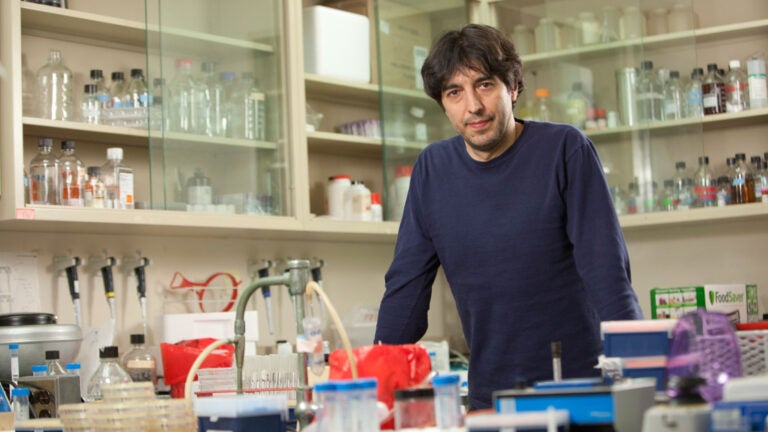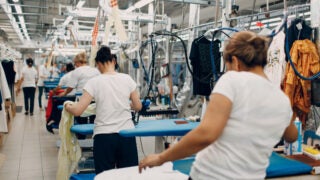
Valter Longo, director of the USC Longevity Institute (Photo/John Skalicky)
What to know about fasting, aging, the ‘longevity diet’ and when you should eat
USC scientist Valter Longo talks about how to live a longer and healthier life
Biochemist Valter Longo has devoted decades to discovering connections between nutrition and successful aging. He runs the Longevity Institute at the USC Leonard Davis School of Gerontology, which aims to extend healthy life spans and finding ways to prevent and treat aging-related conditions. (Think cancer and cardiovascular disease.) Longo is also a professor of biological science at the USC Dornsife College of Letters, Arts and Sciences.
Armed with results from the lab — including clinical trials showing that cycles of a five-day fasting-mimicking diet can reduce risk factors for many life-threatening diseases — Longo calls for change in the kitchen. In this Q&A, the author of the “The Longevity Diet” reveals the role that food can play in keeping us youthful. He touches on a Mediterranean diet and tackles some common misconceptions related to how, what and when we should eat.
How important is food to our health and aging?
Other than genes, it is hard to think of something that can be more powerful than food in determining whether someone is going to make it to 100 or die before 50 years old. We already know that Type 2 diabetes is an invention of a modern diet. This is now one of the biggest diseases in the world. On the other hand, eating the correct foods, ideally through a diet rich in vegetables, legumes, fish, nuts and whole grains, can provide the least costly way to take care of a lot of problems and can be key to a longer and healthier life. Of course, even if you have the perfect diet, some people are going to get diseases, and there is always going to be a need for drugs and interventions.
Much of your laboratory research, as well as that of others before you, has focused on restricting calories as a way to extend life spans. What do we know now?
We’ve known for a long time that reducing calories without malnutrition can extend healthy life spans in animal models. In fact, cancer in calorie-restricted monkeys is about 50 percent reduced. Cardiovascular disease is about 50 percent reduced as well. If we were able to do what we already know how to do in monkeys in people, it would be revolutionary and would eliminate the need for many drugs. But we also know that caloric restriction can be harmful. Ultimately, the monkeys didn’t live much longer because they had as many problems as solutions — and it can be difficult to maintain over time. Periodic diets that mimic fasting offer a circumscribed way to deliver caloric restriction. Lab and clinical studies show that it is perhaps the most potent way to activate protection, repair and rejuvenation processes in the body. Current research on fasting, including a fasting-mimicking diet, represents attempts to understand and leverage the benefits of caloric restriction in a safe and manageable way.
Is that what your ‘longevity diet’ is about?
Yes. The combination of an everyday diet, based in part on studies of centenarians and in part on science and clinical data, with a periodic fasting-mimicking diet, has clinically demonstrated remarkable beneficial effects on aging and disease risk factors. Of course, people should talk to their doctor or dietitian before making any changes to their diets.
What changes would you like to see in people’s everyday diets?
My main recommendations are to follow what we see in most long-lived populations around the world but which also matches the science, which is a diet that is mostly plant-based, low in protein and rich in unsaturated fats and complex carbohydrates. It is primarily an issue of food type and quantity. It is also a matter of oversimplification, in which our society started demonizing entire nutrient groups. The truth is fats are good and bad. Carbs are good and bad. Proteins are good and bad. Fats like olive oil, nuts, salmon are actually associated with positive effects. It is saturated fats and trans fats that are associated with a lot of problems. You hear a lot about low-carb or no-carb diets, but the right carbohydrates, including legumes, vegetables and whole grains, are very good for you. In fact, all the populations who have record longevity have a high carbohydrate diet. All of them. No exceptions. It may seem easier to label foods as good or bad, but in the long run this leads to problems.
What about the timing of when we eat?
It turns out that it is important is to stick very close to 12 hours of feeding and 12 hours of fasting. If you eat 15 hours a day or more, that starts to be associated with metabolic problems, sleep disorders, etc. This is a new habit. If you ask centenarians, it is almost unheard of in these groups. But also, if you fast for longer than 12 or 13 hours, that starts to be associated with problems like gallstone formation, and we also know that longer fasts can lead people to skip breakfast. There are a number of studies, and we have our own data supporting this, showing that skipping breakfast is associated with increased risk for overall mortality and cardiovascular disease. So not only is it not good, it is bad for you.
Do you have an ideal meal?
In the aging field, we are labeled as people preaching to eat less. But I am actually recommending eating more, with large dishes and a lot of food on them. This is really what bariatric surgery is based on. If you have too little food, then the message that your stomach sends to your brain is, “keep eating because I am still empty.” But mechanically if your stomach is full, then the message to your brain is, “I can’t eat anymore, I’m full.” It just has to be the right foods in the right amounts. For example, you can combine maybe two ounces of pasta with seven ounces of garbanzo beans, four ounces of vegetables and about three tablespoons of olive oil. This gives you a good amount of protein, provides a lot of vitamins and minerals, keeps the simple carbohydrates to a limited amount and fills your stomach.
You are from Italy, which is home to some of the longest-lived people and also to pasta. How do the two go together?
The reality is that the Italians who lived so long never ate the large bowls of “only pasta” that people associate as being authentic Italian food. They were the old Italians for whom even pasta was expensive. So they ate what they could grab from their backyards, which was mostly legumes and vegetables, with some pasta. People are accustomed to eating a bowl of pasta or rice with a little bit of whatever on top; it should be the other way around. It should be a ton of beans and vegetables and a little bit of pasta and maybe a sprinkle of cheese. After you make the switch, it actually tastes a lot better.
Longo is the founder of and has an ownership interest in L-Nutra; the company’s food products are used in the human studies of the fasting-mimicking diet. Longo’s interest in L-Nutra was disclosed and managed per USC’s conflicts-of-interest policies. USC has an ownership interest in L-Nutra and the potential to receive royalty payments from L-Nutra. USC’s financial interest in the company has been disclosed and managed under USC’s institutional conflict of interest policies.



